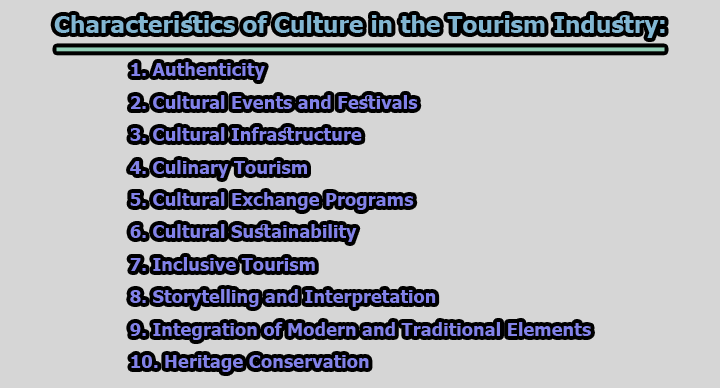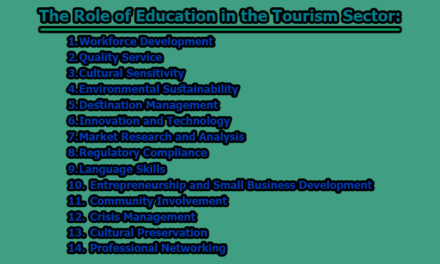Culture plays a pivotal role in the tourism industry, serving as a key driver in shaping the experiences of travelers worldwide. The intricate relationship between tourism and culture is multifaceted, influencing the choices of destinations, the design of travel experiences, and the overall satisfaction of tourists. In this article, we will explore the importance and characteristics of culture in the tourism industry.
Importance of Culture in the Tourism Industry:
1. Attraction and Differentiation: Cultural diversity acts as a potent attraction for tourists. Travelers are drawn to destinations that offer a rich tapestry of traditions, customs, and unique ways of life. The distinctiveness of a culture becomes a key differentiator for tourist destinations, setting them apart in a competitive global market. The allure of exploring something new and unfamiliar motivates individuals to embark on journeys to diverse corners of the world.
2. Cultural Heritage as a Tourism Asset: Cultural heritage, encompassing historical landmarks, artifacts, and traditional practices, is a valuable asset for the tourism industry. Tourists often seek out destinations that preserve and showcase their cultural history. Historic sites, museums, and cultural events become focal points for visitors, contributing to the economic growth of the region while preserving its unique identity.
3. Economic Impact and Job Creation: Cultural tourism has a substantial economic impact, creating revenue streams for local businesses, artisans, and cultural institutions. The spending of tourists on accommodations, dining, shopping, and cultural experiences generates income that ripples through the local economy. Furthermore, the tourism industry creates job opportunities in sectors related to hospitality, entertainment, and cultural preservation.
4. Preservation of Cultural Heritage: The interaction between tourism and cultural preservation is symbiotic. The influx of tourists often results in increased attention and funding for the conservation of cultural heritage sites. Governments and local communities recognize the economic benefits of maintaining these assets, leading to investments in preservation efforts. Tourism, therefore, becomes a driving force for the protection and longevity of cultural treasures.
5. Cultural Exchange and Understanding: Tourism serves as a bridge for cultural exchange, fostering a deeper understanding between people of different backgrounds. Interactions between tourists and locals create opportunities for the exchange of ideas, perspectives, and traditions. This cross-cultural understanding promotes tolerance, breaks down stereotypes, and contributes to the development of a more interconnected and harmonious global society.
6. Promotion of Arts and Creativity: Cultural tourism provides a platform for the promotion of arts and creativity. Local artists, craftsmen, musicians, and performers benefit from the exposure and patronage of tourists. Festivals, exhibitions, and cultural events become showcases for the vibrant creative expressions of a community, adding to the overall appeal of a destination.
7. Cultural Diplomacy: Tourism plays a crucial role in cultural diplomacy, fostering positive relationships between nations. Cultural exchange through tourism builds bridges, facilitates dialogue, and promotes mutual understanding. It becomes a soft power tool that enhances a country’s global reputation and influences international perceptions.
8. Enriching Tourist Experiences: For tourists, cultural experiences enrich their journeys, providing a depth and authenticity that goes beyond mere sightseeing. Whether it’s participating in local traditions, trying regional cuisine, or immersing themselves in cultural festivities, travelers seek meaningful encounters that leave a lasting impression. The cultural dimension enhances the overall satisfaction of tourists, leading to positive reviews and word-of-mouth recommendations.
Characteristics of Culture in the Tourism Industry:
1. Authenticity: Authenticity is a defining characteristic of cultural tourism. Travelers seek genuine, unfiltered experiences that allow them to connect with the authentic way of life, traditions, and customs of a destination. Maintaining the authenticity of cultural offerings enhances the appeal of a tourist destination, as visitors value experiences that are true representations of the local culture.
2. Cultural Events and Festivals: Cultural events and festivals play a crucial role in attracting tourists. These vibrant expressions of a community’s identity showcase its traditions, arts, music, dance, and culinary delights. Incorporating these events into the tourism industry’s offerings provides tourists with unique and immersive experiences, allowing them to participate in and witness the local culture in action.
3. Cultural Infrastructure: The presence of cultural infrastructure is essential for the tourism industry. Museums, theaters, cultural centers, and historical sites serve as repositories of a destination’s cultural wealth. Tourists are drawn to these establishments to gain insights into the local heritage, history, and artistic expressions, contributing to a more profound understanding of the destination.
4. Culinary Tourism: Food is a fundamental aspect of culture, and culinary tourism has become increasingly popular. Local cuisines reflect the traditions, history, and geography of a region. Tourists often seek out authentic culinary experiences, from exploring street food markets to dining in local restaurants. Culinary tourism provides a sensory and immersive way for travelers to connect with the cultural identity of a destination.
5. Cultural Exchange Programs: Cultural exchange programs facilitate interactions between tourists and local communities. Homestays, cultural workshops, and guided tours led by local residents allow tourists to gain a deeper understanding of the host culture. These programs contribute to mutual respect and appreciation between visitors and locals, fostering a more meaningful and authentic travel experience.
6. Cultural Sustainability: The sustainability of cultural tourism is a critical characteristic. Balancing the economic benefits of tourism with the need for cultural preservation ensures that cultural assets are not exploited or degraded. Sustainable tourism initiatives often involve community engagement, responsible tourism practices, and efforts to minimize environmental impact to ensure the long-term viability of cultural experiences.
7. Inclusive Tourism: Inclusivity in cultural tourism ensures that the benefits of tourism are distributed equitably among local communities. Tourism initiatives should involve and empower local residents, fostering a sense of pride and ownership in their cultural heritage. Inclusive tourism also encourages the preservation of indigenous knowledge and practices, preventing cultural commodification.
8. Storytelling and Interpretation: The art of storytelling and interpretation is crucial in presenting a destination’s cultural narrative. Tour guides, cultural interpreters, and informational materials play a role in conveying the significance and stories behind cultural sites. Effective storytelling enhances the visitor’s experience, creating a connection between the tourist and the cultural context.
9. Integration of Modern and Traditional Elements: Cultural tourism often involves a delicate balance between preserving traditional elements and integrating modern conveniences. Destinations that successfully blend historical authenticity with contemporary amenities offer a more holistic experience, attracting a diverse range of tourists with varying preferences.
1o. Heritage Conservation: Heritage conservation is a fundamental characteristic of cultural tourism. Preservation efforts extend beyond showcasing cultural assets to actively maintaining and safeguarding them. This includes restoration projects, conservation of historical buildings, and protection of archaeological sites to ensure their longevity and availability for future generations.
In conclusion, culture is a cornerstone of the tourism industry, shaping the choices of travelers and influencing the character of destinations. The symbiotic relationship between tourism and culture brings about economic prosperity, preservation of heritage, and the promotion of cross-cultural understanding. As the tourism industry continues to evolve, it is imperative to prioritize sustainable and inclusive practices to ensure that cultural treasures remain vibrant and accessible for generations to come. Embracing and celebrating cultural diversity not only enhances the tourism experience but also contributes to the global tapestry of shared human heritage.

Assistant Teacher at Zinzira Pir Mohammad Pilot School and College










